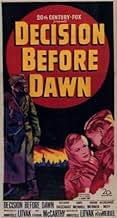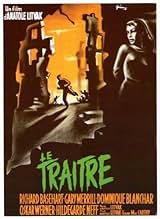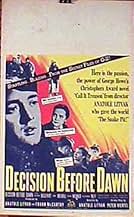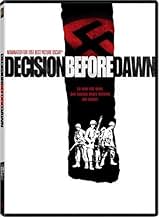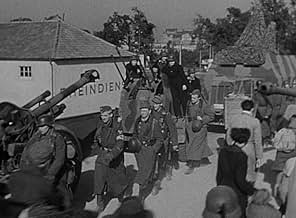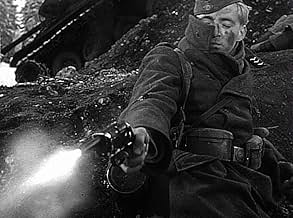IMDb RATING
7.2/10
3.2K
YOUR RATING
As the US Army approaches Nazi Germany, they recruit German prisoners of war to spy behind German lines.As the US Army approaches Nazi Germany, they recruit German prisoners of war to spy behind German lines.As the US Army approaches Nazi Germany, they recruit German prisoners of war to spy behind German lines.
- Nominated for 2 Oscars
- 1 win & 4 nominations total
Hildegard Knef
- Hilde
- (as Hildegarde Neff)
Wilfried Seyferth
- Heinz Scholtz - SS Man
- (as Wilfried Seyfert)
Robert Freitag
- Sgt. Paul Richter
- (as Robert Freytag)
Harold Benedict
- Lt. Pete Gevers
- (as H.L. Benedict S/Sgt. USAF)
H.W. Briggs
- Self
- (as H.W. Briggs Sgt. USA)
D.G. Devine
- Lt. Rennick's Driver
- (as D.G. Devine Cpl. USAF)
L.E. Dixon
- Self
- (as L.E. Dixon Maj. USA)
B.L. Hendrickson
- Self
- (as B.L. Hendrickson T/Sgt. USA)
Featured reviews
A taut story, first-rate acting, and a compelling subject make this film worth seeing.
Espionage/spying is a tricky subject, but "Decision Before Dawn" handles it brilliantly. No flash, no Mata Haris, no absurd coincidences. Weaving human drama and the grim realism of war, this film is that rare gem that manages to teach without preaching.
Among the superb performances is our hero Happy, played with just the right blend of suspense and humanity by Oskar Werner. Happy (an ironic name given to him by his American overseers) is torn between love of his native land and his duty to what is right. Werner walks this tightrope better than most I've seen.
In the end, however, it's the script that is the true gem of the film. Peter Viertel is a master story teller, with such great screenplays as "Saboteur" and "The Hard Way" to his credit. Viertel, with a story by author George Howe, weaves an intricate, but not confusing, narrative of war and devotion and duty. He's one of the few _writers_ I look for when I check out "On TV This Week" on IMDB.
Espionage/spying is a tricky subject, but "Decision Before Dawn" handles it brilliantly. No flash, no Mata Haris, no absurd coincidences. Weaving human drama and the grim realism of war, this film is that rare gem that manages to teach without preaching.
Among the superb performances is our hero Happy, played with just the right blend of suspense and humanity by Oskar Werner. Happy (an ironic name given to him by his American overseers) is torn between love of his native land and his duty to what is right. Werner walks this tightrope better than most I've seen.
In the end, however, it's the script that is the true gem of the film. Peter Viertel is a master story teller, with such great screenplays as "Saboteur" and "The Hard Way" to his credit. Viertel, with a story by author George Howe, weaves an intricate, but not confusing, narrative of war and devotion and duty. He's one of the few _writers_ I look for when I check out "On TV This Week" on IMDB.
Having served in the US Army-Europe in Germany it was easy to see that this work was an accurate depiction of the world as Germans saw it in those years. Going to the IMDb database confirmed that it was filmed in Wurzberg, a city I visited many times. One can not help but wonder what memories and nightmares came back to life for the German people in this movie, or the ones who viewed it, or even witnessed the movie being made. The film is so very realistic in script, acting, and setting that some must have almost thought WWII was alive again. For those that lived through WWII in that country it must have seemed as if those days were repeating themselves. Every detail of this movie is accurate as far as I could tell. It does not employ overused stereotypes, no action heroes, no earth shaking grand and glorious finale, it simply depicts a period of time in all its' tragedy and irony in a most realistic manner. This work deserves more praise and exposure than it has received. A must see for every WWII researcher and historian.
I have seen this film on cable several times. Some of the scenes that are supposed to be in Wurzburg are actually in Munich. The chase scene in the rubble towards the end of the film was near the old Bavarian "Rezidence" or Royal palace that the Wittelsbach family lived in near the old town area of Munich. I recognized the Kriegsmuseum building which is now the seat of the Bavarian state government. Other than that I really enjoyed the film. Having read countless stories about the demise of the once mighty Wehrmacht this film was, to me, accurate in its portrayal of soldiers beaten down and waiting for the inevitable end. Werner has been one of my favorite actors. His performances in "The Spy who came in from the Cold", "Fahrenheit 451" are very good.
Those were the outcasts of WW2.German war prisoners who decided to rebel against their country.
Karl-aka "Happy" - agrees to become a spy in the "pay" of Americans at the end of WW2 in his country .A country in ruins.The "Third Reich " which should have lasted one thousand years was collapsing.Oskar Werner gives a restrained moving performance.If "underacting" has a meaning (not meant pejoratively) ,that's exactly what it is.He watches his country fall as if he does not belong there anymore.He meets people he used to know ,a girl (Knef) he could love (but he won't),but he knows from the start that wherever he goes,he is an outcast.His new "Friends" use him as a pawn in their game,and " his motherland will not cradle him anymore" .
Anatole Litvak,an European who used to work in France -where the first scenes take place- in the thirties (and later would in the fifties/sixties)knows what he is talking about.He joined the army during WW2;and "decision before dawn" was one of his finest achievements .
Like this? try this...
Vent d' Est Robert Enrico 1993
Karl-aka "Happy" - agrees to become a spy in the "pay" of Americans at the end of WW2 in his country .A country in ruins.The "Third Reich " which should have lasted one thousand years was collapsing.Oskar Werner gives a restrained moving performance.If "underacting" has a meaning (not meant pejoratively) ,that's exactly what it is.He watches his country fall as if he does not belong there anymore.He meets people he used to know ,a girl (Knef) he could love (but he won't),but he knows from the start that wherever he goes,he is an outcast.His new "Friends" use him as a pawn in their game,and " his motherland will not cradle him anymore" .
Anatole Litvak,an European who used to work in France -where the first scenes take place- in the thirties (and later would in the fifties/sixties)knows what he is talking about.He joined the army during WW2;and "decision before dawn" was one of his finest achievements .
Like this? try this...
Vent d' Est Robert Enrico 1993
Surprisingly good war film unknown to me before I saw it on American Movie Classics. Cast is excellent. Characters are well-drawn. The film is the best portrayal I have yet seen on celluloid of Germany in its stages of final collapse as the end of WWII nears. Some very impressive interiors are beautifully shot - the cathedral that serves as intelligence hq, and the castle or chateau that is the German command hq. Engrossing story of conflicted loyalties, and good action and suspense as well. I can only add my agreement with the positive comments already entered.
Did you know
- TriviaOne of the first films after World War II to portray the German people--outside of the Nazi regime--in a sympathetic light.
- GoofsKarl is mistakenly called a corporal. The Luftwaffe uniform that he wears both in the US POW cage and while back in Germany has the rank insignia of an "Obergefreiter", specifically three winged emblems on the collar patches, plain shoulder straps and two chevrons on his left sleeve. Also when the list is checked for his name at the bridge the rank is written down as 'Gfr' (gefreiter) The ranks of Gefreiter, Obergefreiter and Stabsgefreiter (all which were partially identified by chevrons on the sleeve) were not NCOs and had no command authority over other soldiers. They were simply grades of seniority and would be more equivalent to Private First Class (PFC) in the US military. The German rank that is the closest equivalent to Corporal is Unteroffizer. Also, Karl is wearing the medical badge on his right sleeve; Luftwaffe enlisted medical personnel wore the badge on the left sleeve, while Wehrmacht (army) wore it on the right.
- Quotes
Lt. Dick Rennick: [Intro narration] Of all the questions left unanswered by the last war, and probably any war, one comes back constantly to my mind. Why does a spy risk his life... for what possible reason? If the spy wins, he's ignored. If he loses, he's shot.
- ConnectionsReferenced in That Girl: Decision Before Dawn (1968)
- SoundtracksAch, wie ist' möglich dann (Treue Liebe)
(uncredited)
Written by Friedrich Kücken (1827)
- How long is Decision Before Dawn?Powered by Alexa
Details
- Release date
- Countries of origin
- Languages
- Also known as
- Decisión al amanecer
- Filming locations
- Production companies
- See more company credits at IMDbPro
- Runtime1 hour 59 minutes
- Color
- Aspect ratio
- 1.37 : 1
Contribute to this page
Suggest an edit or add missing content



